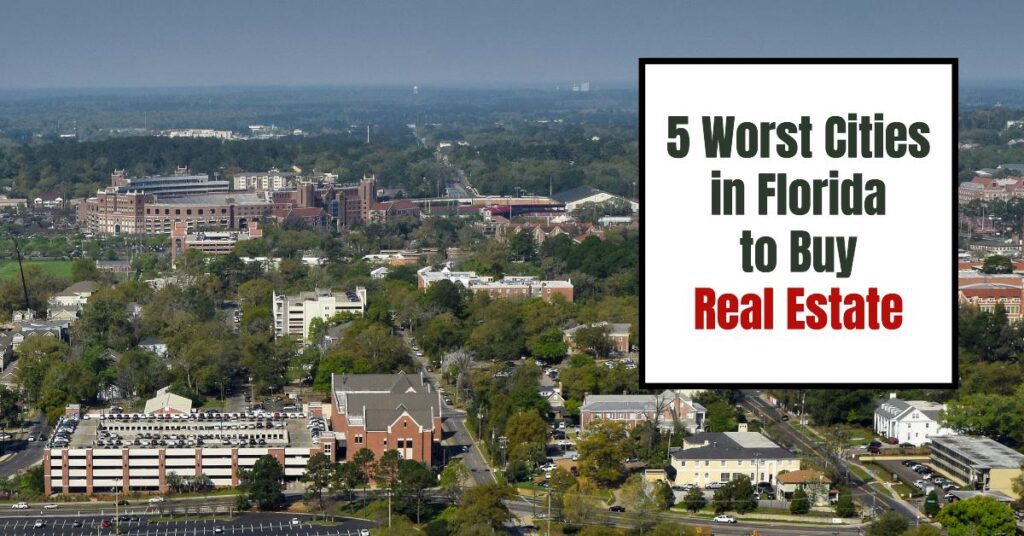The Five Worst Cities for Real Estate Investment in Florida for 2024
When it comes to investing in real estate, location is everything. Florida, with its vibrant culture, stunning beaches, and warm climate, appears to be a prime market. However, not all cities within the Sunshine State are suitable for wise real estate investments. This guide will highlight the five worst cities to buy property in Florida for 2024, offering insights that can prevent costly mistakes.
Understanding Market Pitfalls
It’s essential to recognize why specific cities don’t perform well in real estate. Investors often misjudge alluring opportunities, only to discover they’re navigating a financial minefield. Factors like crime rates, market dynamics, and economic conditions can severely impact property values. By staying informed, you can secure a profitable investment.
5 Worst Cities to Buy Real Estate in Florida
1. Miami Beach
Miami Beach frequently graces lists of unwise real estate investments. Although it shines as a luxury destination, consider these drawbacks:
- Skyrocketing Prices: Median home prices exceed $1 million, placing it out of reach for many prospective buyers.
- Fluctuating Market Demand: Reliance on tourism leads to seasonal property fluctuations, creating potential downturns during off-peak times.
- Intense Competition: A surge of investor interest has inflated property prices, limiting returns.
- Natural Disaster Vulnerability: Prone to hurricanes and flooding, the added insurance costs can significantly cut into profits.
For a comprehensive look at Miami Beach’s real estate challenges.
2. Daytona Beach
Daytona Beach combines motorsports with beach enjoyment, but it poses risks for real estate investors:
- High Vacancy Rates: Increasing numbers of vacant properties can lead to lost revenue for landlords.
- Population Decline: A trend of residents relocating for better opportunities is diminishing housing demand and property values.
- Economic Vulnerability: With a tourism-focused economy, any shifts in travel trends can destabilize the housing market.
- Quality of Life Concerns: Elevated crime rates may deter families from moving here, impacting financial stability for landlords.
Delve deeper into Daytona Beach’s real estate market.
3. Fort Myers
While Fort Myers attracts buyers with its charm, it has notable drawbacks for real estate investment:
- Oversaturation of Listings: An abundance of properties without sufficient buyer interest leads to potential decreases in value.
- Developmental Uncertainty: Recent developments haven’t consistently resulted in rising property values.
- High Maintenance Costs: Weather-related property damages contribute to inflated maintenance expenses, reducing profitability.
- Uncertain Future Growth: A mix of historic and new developments creates unpredictability in property market trends.
Learn more about Fort Myers’ market dynamics.
4. Pensacola
Pensacola’s coastal appeal masks significant investment drawbacks:
- Inconsistent Property Values: Wavering market conditions can lead to financial losses for uninformed investors.
- Lack of Economic Diversification: With heavy reliance on tourism and military sectors, job growth is challenging, impacting housing demand.
- Crime Rate Issues: Increased crime in some neighborhoods can deter families, further harming property values.
Gain insights into Pensacola’s housing market.
5. Ocala
Ocala stands out for several reasons that make it less attractive for investors:
- Market Stagnation: Property values have seen little growth lately, leading to stagnating investment returns.
- Limited Job Opportunities: A lack of diverse employment options limits population growth and housing demand.
- Aging Infrastructure: Residents may face high renovation costs due to outdated facilities, impacting transaction and maintenance expenses.
Be cautious with investments in Ocala’s real estate.
Analyzing the Broader Florida Housing Market in 2024
Recent data suggests that Florida’s housing market will have mixed results in 2024:
- Shifting Consumer Preferences: Buyers increasingly favor affordable cities, which could devalue properties in expensive locales like Miami Beach and Fort Myers.
- Rising Interest Rates: Higher mortgage rates may deter buyers in less desirable markets.
- Infrastructure Investments: Areas with improved infrastructure are projected to yield higher returns, making cities like Ocala and Daytona Beach less appealing.
- Luxury Market Resilience: High-end properties may remain in demand, driven by overseas buyers, though this won’t significantly affect the markets of our highlighted cities.
Understanding these trends is critical for informed decision-making in real estate.
Final Thoughts
Florida’s real estate landscape can be both enticing and challenging. Recognizing the five worst cities to buy property—Miami Beach, Daytona Beach, Fort Myers, Pensacola, and Ocala—can help investors avoid costly mistakes. Each presents unique challenges that could jeopardize current and future property values.
While Florida continues to attract investors, thorough market research and an awareness of economic conditions are indispensable. By analyzing the characteristics of each locale, you can avoid pitfalls and locate promising investment opportunities.
Key Takeaways for Investors
- Conduct thorough market research before making investments.
- Be aware of local economic conditions that impact property values.
- Stay informed on market trends to anticipate potential changes.
- Focus on areas with sustainable growth potential rather than those that are currently trendy.
By adhering to these guidelines, investors can achieve successful outcomes aligned with their financial goals in the Florida housing market.
For anyone looking to delve into turnkey real estate investing, partner with experts to discover high-quality, ready-to-rent properties designed for consistent returns. Contact our investment counselors today to broaden your real estate portfolio with confidence. Call (800) 611-3060 to get started!


